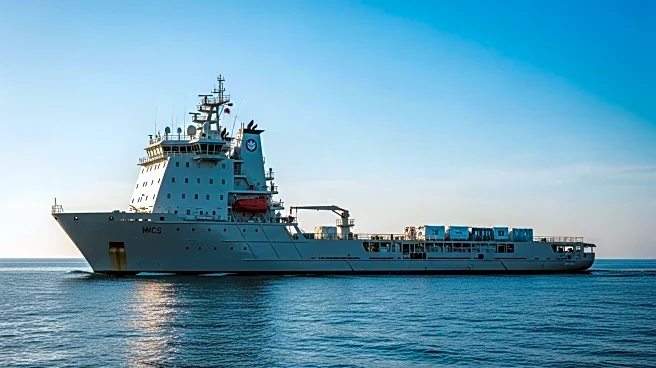What's Happening?
The Brazilian Navy is actively pursuing the acquisition of logistics support ships as part of its strategic modernization efforts. Vice Admiral Marcelo da Silva Gomes, Director of the Directorate of Navy Programs Management, announced the initiative, known as the Navio de Apoio Logístico (NApLog) project. This project is aligned with the Navy Strategic Plan 2040 and aims to enhance the Surface Force Command's capabilities. The plan involves acquiring two ships by 2033, with a budget of BRL1.2 billion (USD219.8 million). The first ship is expected to be procured between 2026 and 2027, and the second between 2028 and 2033. These ships will support disaster relief, search-and-rescue, and humanitarian aid operations, providing medical support and transporting essential supplies.
Why It's Important?
The acquisition of logistics support ships is crucial for enhancing Brazil's naval capabilities in humanitarian missions. These ships will play a vital role in disaster relief and search-and-rescue operations, which are increasingly important in the face of global challenges such as natural disasters and humanitarian crises. By investing in these ships, Brazil is positioning itself to respond more effectively to emergencies, both domestically and internationally. This move also reflects a broader trend among nations to bolster their humanitarian response capabilities, highlighting the growing importance of military assets in non-combat roles.
What's Next?
The Brazilian Navy's strategic plan outlines a timeline for the procurement of these ships, with the first expected between 2026 and 2027. As the project progresses, the Navy will likely engage with international partners and suppliers to ensure the ships meet the required specifications. Additionally, the Navy may seek to integrate advanced technologies to enhance the operational capabilities of these vessels. Stakeholders, including government agencies and humanitarian organizations, will be closely monitoring the development of this project, given its potential impact on regional and global humanitarian efforts.
Beyond the Headlines
The initiative to acquire logistics support ships underscores the evolving role of military forces in humanitarian operations. As climate change and geopolitical tensions increase the frequency and severity of disasters, military assets are becoming essential tools for humanitarian aid. This development may prompt other nations to consider similar investments, potentially leading to increased collaboration in international humanitarian missions. Furthermore, the integration of advanced technologies in these ships could set new standards for efficiency and effectiveness in disaster response.










